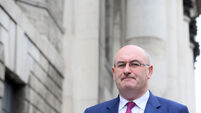Elaine Loughlin: Hard work and humility have brought Dara Calleary back in from the cold

Dara Calleary who replaced Robert Troy as a junior minister impressed many in 2020 with his swift and gracious resignation from as agriculture minister in the wake of Golfgate. File picture: Gareth Chaney/Collins
Dara Calleary’s political comeback is a lesson in how a bit of humility and some hard work can bring anyone in from the cold.
This time two years ago, Mr Calleary, then a senior minister, was forced to resign amid public fury over the Golfgate fiasco, which struck a nerve with a cooped-up public who were growing frustrated over continuing Covid restrictions.
















